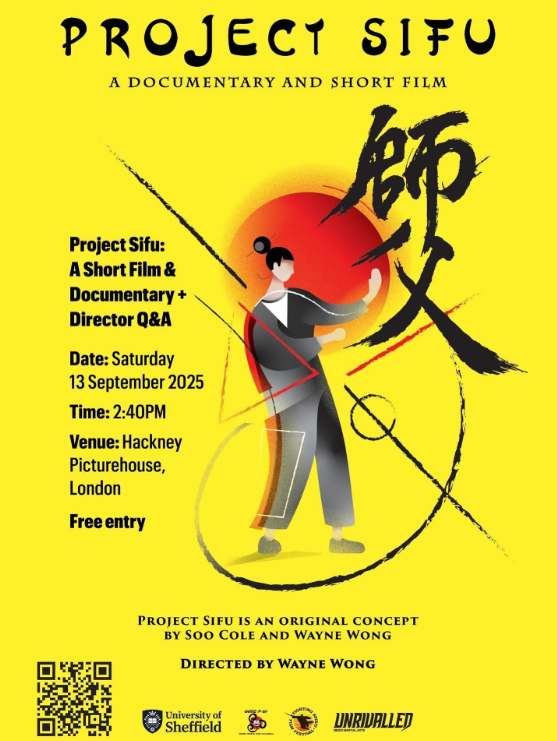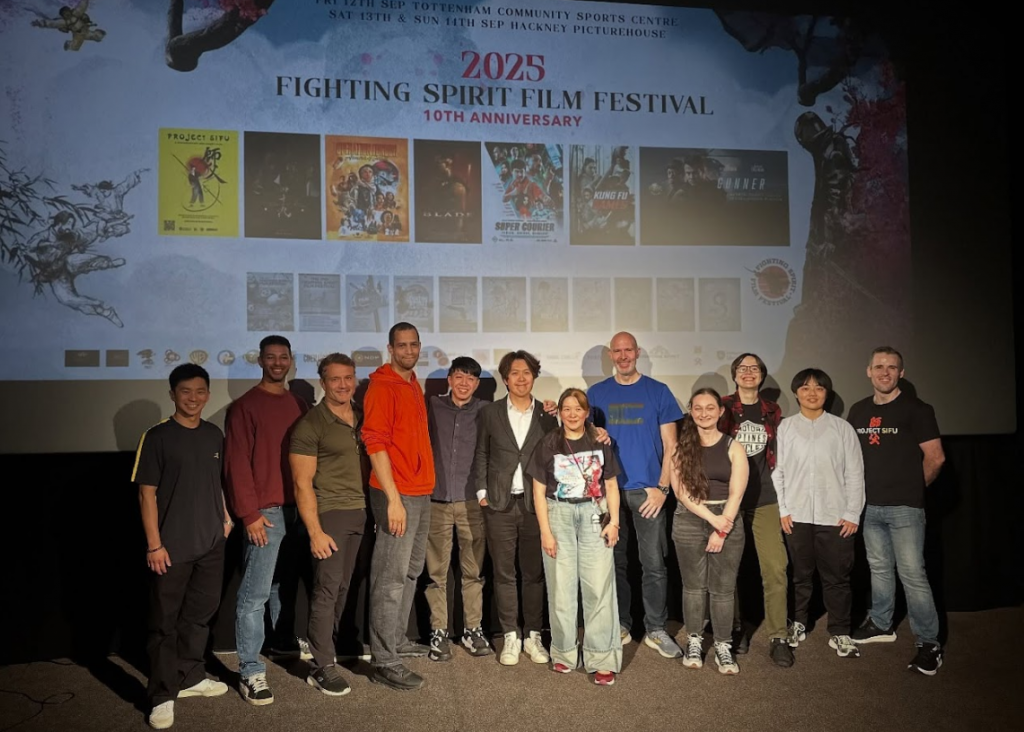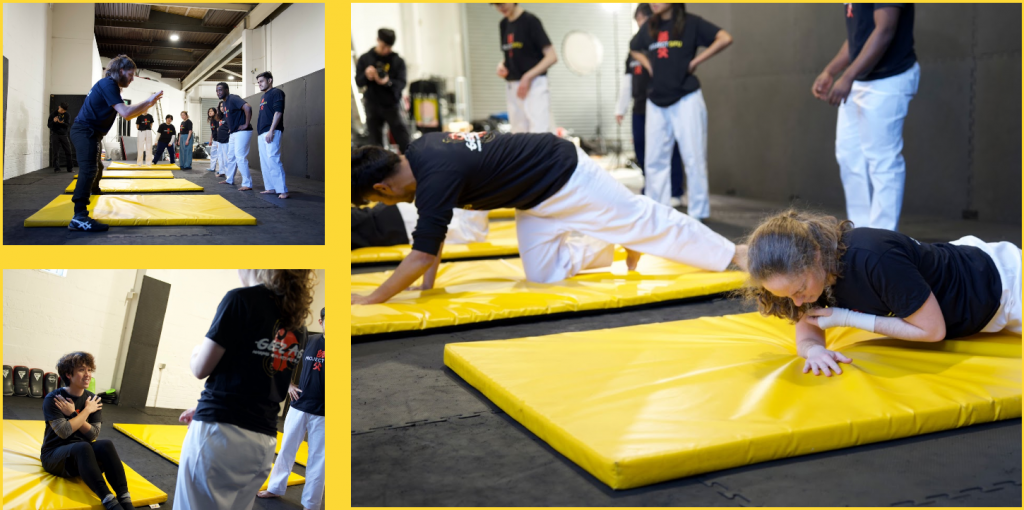
“It may seem difficult at first, but all things are difficult at first..”- Miyamoto Musashi
In Bruce Lee’s original script for The Game of Death (1972), the film was meant to end with a subtle moment of introspection. Lee’s protagonist would gaze into a mirror, confronting his own reflection, a cinematic metaphor for Bruce Lee`s personal philosophy: that martial arts is a path to self-understanding. Through disciplined practice, the martial artist identifies strengths, confronts weaknesses, and highlight rough edges of character and technique alike.
This spirit of self-improvement through the power and discipline of martial arts is central to Project Sifu (2025). The documentary chronicles students as they take part in The Project Sifu initiative which was developed as a collaboration between Dr. Wayne Wong from Sheffield University and Soo Cole co- founder and organiser of The Fighting Spirit Film Festival. Designed for students with little or no prior experience in the martial arts but have the willingness to learn the aspects of martial arts and film making , through a 12-week crash course in martial arts and action film-making, culminating in a short film that captures their creative and personal growth. The documentary chronicles the students’ transformation as they train, stumble, adapt, and grow. Only at the end do we see the final product: a fully realised short film, the distilled result of 12 weeks of sweat, self knowledge , and personal breakthroughs., celebration of learning by doing — and a tribute to the martial arts ethos that the real fight is often behind the scenes.
The film received high praise from the audience at this year’s Fighting Spirit Film Festival in London, earning acclaim for its authenticity and creative vision. It was also featured as a centrepiece presentation at the UNESCO-ICM International Martial Arts Seminar in Seoul, South Korea a testament to its cultural resonance and global relevance within the martial arts community. So what actually does the term “Sifu” mean ? In the Chinese tradition , Sifu (師師) loosely
translates to “fatherly teacher.” Yet the role of a Sifu transcends the Western notion of an academic coach or instructor. A true Sifu teaches not only through structured lessons, but through example, mentorship, and shared experience. Learning unfolds within a close-knit group, where students support one another, collaborate creatively, and evolve together under the Sufi’s guidance, creating an environment of inclusion and shared learning. One of the most meaningful elements of the project was the sense of unity that emerged throughout the initiative . A powerful symbol of this came through Matt Law founder of the
Charity Geeza Gi , who generously sponsored the students’ training T-shirts. In martial arts, the uniform is more than just clothing — it’s a statement of equality, discipline, and belonging. Regardless of background, ability, or experience, everyone wears the same uniform and is part of a “Martial family”. Narrated with insight and heart, the documentary highlights not only the on-screen action but the off-screen dedication — the sweat, setbacks, breakthroughs, and bonds forged along the way. It celebrates the principles at the heart of the Sifu tradition: mentorship, perseverance, and the belief that true mastery begins with self-reflection.
The documentary traces the full arc of the project’s process: from early lessons in the history and philosophy of martial arts, from practising basic moves such as how to fall safely and forward rolls, to hands-on training in safe choreography, reaction timing, and fight scene fundamentals. Alongside physical practice, students were immersed in the cinematic craft learning the essentials of camera work, lighting, sound design, and editing all under the guidance of seasoned mentors with many years of martial arts and film making experience.
The project drew a diverse group of applicants with varying experience in martial arts and film-making. As training focused on basics, discipline, and a family ethos, some found the pace slow or the process too demanding of their time. Over time, only those with commitment and collaborative spirit remained, reflecting the Sifu tradition. The lesson: success comes from showing up, persevering, and learning from setbacks.

By the end of the 12-week journey, a dedicated core remained:
Akanksha Gowri, Esme McNicholas, Fangzhuo Zhao, Grace Gidley, Orla Dowey, Silvia Schettini, Su Myat Sint, Vishaal Neelamegam Baskaran, Yilin Chen, and Rhoda Rao — with Vishaal as the sole male student
The project faced the challenge of adapting male-centric fight choreography for a predominantly female group. The solution was found in Wing Chun — a fluid, adaptable martial art, said to be founded by the Shaolin nun Ng Mui. Cinematic touchstones like Michelle Yeoh’s Wing Chun (1994) and Ip Man (2004) provided powerful visual inspiration.
Martial arts cinema is a living, evolving art shaped by culture and creativity. Under coach Kirk Bytheway at The Unrivalled MMA Gym in Sheffield, students trained hard while guest mentors — Jamie Coates, Joe Lam, Jon Alagoa, Matt Routledge, Nathan Geering, Sam Mak, and Tomas Parades — shared expertise in choreography, performance, sound, editing, and cinematic language. Their contributions, highlighted throughout the documentary, revealed the diverse philosophies that define the genre.
An interlude in Project Sifu charts the evolution of martial arts cinema — from early works like The Red Heroine (1928) and the Wong Fei Hung serials, through Shaw Brothers’ wuxia epics and the realism of Bruce Lee and Jackie Chan, to the 2000s revival with Ip Man and Crouching Tiger, Hidden Dragon. Today, the genre is a global mosaic, with directors like Gareth Evans (The Raid, 2011) adding new traditions and styles, all rooted in self-expression through movement. Guest participants Matt Law and Sam Cheung, alongside Soo and Dr. Wayne Wong, enriched the project with creative testing and collaboration, while stunt choreographer Tomas Paredes highlighted the demanding, often dangerous legacy of Hong Kong stunt work.

But everything shifted when someone told him, simply and powerfully, “Never be ashamed of your heritage.” That moment became a turning point. Sam began to embrace his martial arts roots—not just as a practitioner, but as a storyteller. He channelled his skills into film-making and later became a mentor within Project Sifu, helping others reclaim their narratives with pride and authenticity.
Students learn how to fall correctly using Modern Student Pads, harnesses, and controlled environments. Technology plays a key role — with pre-visualisation techniques tools, helping choreographers design complex sequences without compromising safety.
One of the core themes explored in Project Sifu is cultural identity—re-framing martial arts not as a stereotype, but as a source of pride and personal power. A particularly moving moment in the film features stuntman, film-maker, and British Wushu champion Sam Mak, who shares his experience growing up as one of the few Asians in his local community. For years, he kept his Wushu training and tournament victories hidden, fearing they would reinforce clichéd perceptions of Chinese identity.
Project Sifu (2025) was never just about learning to fight — it was about listening, adapting, and creating together. The cohort’s choreography reflected not only martial skill but also respect, resilience, and shared growth.
As part of their development, students studied iconic fight scenes — from Jackie Chan’s rooftop comedy in Who Am I (1998), to Jet Li’s shadowless kick in Once Upon a Time in China II (1992), to the grounded realism of Ip Man 2 (2005). They drew direct inspiration from Donnie Yen’s brutal, MMA-infused Flash Point (2007) and the reactive combat system of the video game Sifu (2022), learning lessons in style, rhythm, and cinematic language.
Despite differences in background, language, and experience, the group persevered. They supported one another through challenges, collaborated with purpose, and embraced traditions — from tidying the gym to sharing meals and even learning chopsticks together.
The project became a celebration of pride, identity, and cultural legacy. Its most moving moment came in a graduation ceremony where students and mentors received Chinese names in handwritten calligraphy — a gesture of lineage, belonging, and transformation, symbolising not just achievement but a deeper sense of responsibility and self-worth.
The closing short film in Project Sifu which was in part inspired by Sam Mak`s movie Crouching Carpet, Heading Home (2024) which was showcased at the Fighting Spirit Film Festival, encapsulates the core elements and tropes the students studied throughout their journey — from classic fight choreography and rhythm to camera angles, comedic timing, and emotional storytelling. It also showcases their acting ability, creative instincts, and collaborative spirit.
In the segment, Dr. Wayne Wong jokingly declares that the students must decide who will clean up the gym after training. Naturally, a fight breaks out — not out of anger, but as a playful contest. What follows is a choreographed sequence full of comedy, stylised action, and cinematic flair. The students apply everything they’ve learned: selling moves through camera angles, editing for impact, and maintaining rhythm and style throughout the scene.
The payoff is both funny and profound. After the dust settles, the students choose to clean up together — a moment that mirrors their real-life teamwork during the project. It’s a final beat that reflects the ethos of martial arts: discipline, respect, humility, and unity.
Project Sifu (2025) sparked a deeper interest in storytelling, performance, or physical discipline. More importantly, the experience equipped them with transferable skills — from teamwork and creative problem-solving to discipline, communication, and resilience — that they could carry forward into their future careers and academia.
While Project Sifu delivers a heartfelt and inspiring journey, the documentary does have a few rough edges. One area that could have added greater depth would be interviews with more of the mentors not just about their teaching methods, but about the wisdom passed down to them by their own Sifu`s or mentors., hearing what pieces of advice shaped their paths, what philosophies they carry forward, and how tradition informs their approach could have offered a richer understanding of the lineage behind the project. These reflections he quiet teachings, the personal mantras, the moments that stayed with them could have beautifully reinforced the theme that martial arts is not just about movement, but meaning.
Project Sifu (2025) represents the first fruits of a bold creative experiment — a seed planted with care, discipline, and collaboration. It would be exciting to see a long-form sequel that expands the scope beyond student-aged participants, involving a wider range of ages, backgrounds, and life experiences.
In a short time, the Project Sifu initiative achieved something remarkable. Blending martial arts, film-making, and cultural reflection, it redefined martial arts not as aggression but as pride, discipline, and personal growth.
Its impact reached beyond choreography, inspiring students to rethink identity, tradition, and teamwork. By opening doors to those from diverse backgrounds, it showed how martial arts can unite communities — and hinted at how the same framework could revive other folk traditions, from dance to calligraphy to crafts. Like other arts such as music, dance, or poetry, the martial arts—and the craft of martial arts film-making—resonates differently for each individual, and cannot be boxed or defined. In an age shaped by AI and digital polish, what people truly crave is authenticity — raw, unfiltered content and lived experiences that reflect real emotion, real effort, and real connection, and that is what. Project Sifu (2025) brings this human aspect to the table by the bucket-load. A planned continuation of the initiative and a longer sequel to the film is in the works. Project Sifu (2025) is scheduled to be showcased around the world at further screening events and seminars which will see promote the powerful aspects of martial arts and the skills involved in film making. As the traditional martial arts adage goes:
“A Sifu does not create followers — they inspire others to walk the journey ahead.”
It is a journey I will be keen to watch how it grows and evolves over the forthcoming months and years ahead, and hopefully inspire a resurgence of interest in all things martial arts related, as well as self-respect and respect for diversity and others.
BknlAYASwmLpSNQldWrmGFeh
lDQXDVmOTQoddjnGS